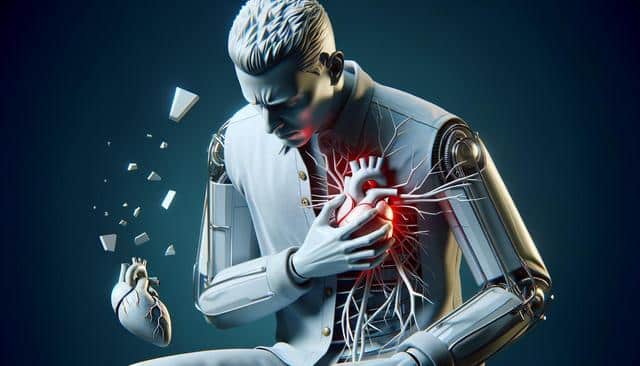Understanding the Early Symptoms of a Heart Attack
Early symptoms of a heart attack can include chest pain, shortness of breath, nausea, lightheadedness, and discomfort in the arms, back, neck, or jaw. If you or someone else experiences these symptoms, seek immediate medical attention to minimize risk and receive proper treatment.

Recognizing Chest Discomfort
One of the hallmark early symptoms of a heart attack is chest discomfort. This doesn’t always feel like the sharp pain often portrayed in movies. Instead, it may be experienced as pressure, tightness, fullness, or a squeezing sensation in the center or left side of the chest. The discomfort can last for more than a few minutes or go away and return. Not everyone experiences chest pain in the same way, and some people may even dismiss it as indigestion or muscle strain.
Chest discomfort can occur during activity or at rest and is often triggered by physical or emotional stress. It’s important not to ignore this symptom, especially if it is accompanied by other signs like sweating or nausea. For some individuals, particularly women, the elderly, or people with diabetes, chest pain may be mild or even absent. This variation makes it essential to be aware of other accompanying symptoms.
Shortness of Breath and Fatigue
Shortness of breath, even without chest pain, can be an early warning sign of a heart attack. It may occur during physical activity or while at rest and is often described as a feeling of being unable to catch your breath. This symptom results from the heart’s decreased ability to pump blood efficiently, affecting oxygen flow throughout the body.
In addition to shortness of breath, unexplained fatigue or weakness can also indicate a problem. People experiencing a heart attack may feel unusually tired for days or weeks leading up to the event. This is particularly common in women. Signs to watch for include:
- Feeling winded while doing routine tasks
- Sudden exhaustion after minimal exertion
- Trouble sleeping due to breathing difficulty
These symptoms may be subtle but should not be overlooked, especially when they appear alongside other indicators of a heart issue.
Nausea and Cold Sweats
Digestive symptoms, such as nausea, vomiting, or a feeling of indigestion, can also signal a heart attack, especially when accompanied by lightheadedness or cold sweats. These signs are often misattributed to gastrointestinal problems, but when they occur with other heart-related symptoms, they warrant immediate attention.
Cold sweats are another concerning sign. These are not the result of heat or exercise but occur suddenly and may be accompanied by clammy skin. This reaction is your body’s response to stress caused by reduced blood flow due to a blocked artery. It’s important to differentiate between normal digestive discomfort and heart-related symptoms by evaluating the context and combination of symptoms.
If you notice the following, consider seeking medical help:
- Nausea or vomiting combined with chest discomfort
- Cold sweats without a clear cause
- Sudden dizziness or fainting
Pain in Other Areas of the Body
While chest pain is the most commonly recognized symptom, pain or discomfort in other areas of the body can also indicate a heart attack. This pain can radiate to the arms (especially the left one), back, neck, jaw, or stomach. It might start in the chest and move outward, or it can appear in these areas without any chest symptoms at all.
This radiating pain is often described as a dull ache or pressure and can be intermittent or persistent. It may also worsen with activity and improve with rest, which can mislead individuals into thinking it is muscle-related. Key points to watch for include:
- Unexplained pain in the shoulders or upper back
- Jaw pain that is not related to dental issues
- Arm pain that comes and goes
Being aware of these less obvious symptoms can make a critical difference in seeking timely medical intervention.
Lightheadedness and Anxiety
Feeling lightheaded, dizzy, or faint can be a sign of reduced blood flow to the brain, often caused by a heart attack. These symptoms may occur suddenly and are sometimes accompanied by a sense of anxiety or a feeling of impending doom. While lightheadedness can result from dehydration or standing up too quickly, it becomes concerning when paired with other heart attack symptoms.
Sudden anxiety or a sense that something is “not right” can be your body’s way of signaling a serious issue. Many people report feeling unusually anxious before a heart attack, even if they have no history of anxiety disorders. Symptoms to monitor include:
- Sudden dizziness not related to a known cause
- Feeling faint or weak without explanation
- Unexplained feelings of panic or dread
Trusting your instincts and recognizing when your body is signaling distress can be critical. If these symptoms arise, especially in conjunction with others mentioned, prompt medical evaluation is essential.
Conclusion: Staying Alert Can Save Lives
Understanding the early symptoms of a heart attack can make a crucial difference in how quickly someone receives care. While chest pain is a well-known indicator, symptoms like shortness of breath, fatigue, nausea, radiating pain, and lightheadedness can also signal an underlying heart issue. These signs may be subtle, develop slowly, or be mistaken for less severe conditions, particularly in women and older adults.
Recognizing the variety of symptoms and seeking immediate medical attention when they occur can significantly improve outcomes. If you or someone you know experiences these warning signs, do not delay in calling emergency services. Taking symptoms seriously and acting quickly could help prevent serious damage and potentially save a life.